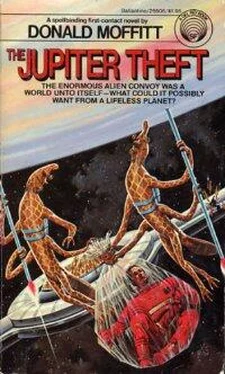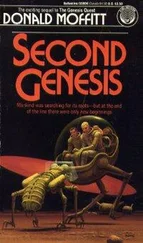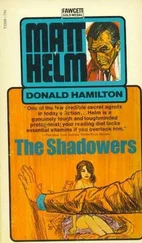He turned back to Maggie’s living room. It was sparsely furnished, but the pieces he could see looked good. There was a couch upholstered in an expensive coarse fabric, and an antique coffee table made of glass and driftwood. There was a transparent rocking chair facing the couch, and a Lexiglass cabinet holding Maggie’s collection of twentieth-century plastic bottles completely covered one wall.
“Fix yourself a drink and put some music in the slot,” she said, heading for the door at the far end. “I’m going to peel off these tubes and put on something more comfortable.”
Jameson wandered over to the omnisound hanging on the wall. Maggie’s collection of music cards was stacked untidily on a little shelf beneath it. He flipped through the plastic oblongs, reading the titles showing through the meaningless herringbone patterns of the holo imprints that held the music. It was the usual pop junk put out by the big music combines—creative-group stuff, with the words sung by whatever computer-constructed pseudovoices were the fads of the moment.
But there was a small stack of cards that didn’t seem to go with the rest. They looked newer, unplayed. Bach’s Art of the Fugue. A couple of Mozart symphonies. And—he blinked—the out-of-print collection of Farnaby virginal pieces he’d been trying to track down for years. How had Maggie managed to stumble on such a rarity?
He slipped the card into the slot of the omnisound, and the strange, otherworldly tones of “Giles Farnaby’s Dreame” began to float into the room. The Moog technician had given it a pure, lutelike twang, sustained beyond what would have been possible for a real instrument, but otherwise hadn’t tampered with it.
Jameson scooped some frozen martini from the nitrogen-chilled vessel on the sideboard and dropped it into a clear stemmed glass, where it caused a satisfying instant explosion of frost. He carried his drink over to the view window, and was losing himself in the glorious sparkle of the vista when Maggie entered the room, wearing a slinky green pantsgown made of some frictionless fluorocarbon material that slid over the surface of her body like oil.
“You must have been reading my mind,” she said. “You’re playing one of my favorites.”
The image faded from the screen. “Is that all you have?” Ruiz asked.
“Yes, sir,” the NIB tech said, lifting his head from his knobs and dials. “We had less than a minute before the camera vehicle burned out. Only two frames at that rate of transmission. No time to adjust the focus—we were stuck with what was already in the memory accumulator. And as it was, we pushed computer enhancement to the point where that close-up image is ten percent conjecture.”
“Play it again,” Ruiz said.
He was sitting comfortably in an upholstered chair in the small semicircular projection room the NIB had cleared out for him. Maybury, grave and attentive, was seated next to him, an adequate little hand-held computer resting on her lap. General Harris was sitting a few seats away with a couple of his courteous thugs.
The tech replayed the sequence in real time. First there was that puzzling cluster of bent angular shapes, distorted by the computer’s efforts to achieve optimum resolution. Details were blurred, and there was a discontinuity in some of the straight lines that suggested image compromise. Thirty seconds of that, with the original zoom stopped. Then everything on the screen twitched as the second frame cut in. The things were moving, turning somehow. All the shapes were different. There was a slice of the Cygnus Object’s moon for comparison. That hadn’t changed at all. The third frame was nothing but a glare of red. That was when the camera vehicle had melted.
“Well?” General Harris demanded.
Ruiz pulled at his chin. “It appears that the planet from Cygnus brought some debris along with it. A moon. And now those things. They can only be artifacts.”
“Artifacts? Thirty miles across? Why not asteroids?”
Ruiz shrugged. “Don’t let the irregular shapes fool you. Don’t forget we’re seeing them in different planes. I’ll have to write a computer program to rotate them in three dimensions—with five different shapes, we ought to have enough input—but offhand I’ll guess that they’re Y-shaped or T-shaped, with a fourth axis at right angles to the other three. We never see fewer than three arms—the one at upper left was almost a perfect T—or more than four, like the one that resembled the Greek letter psi, where the long center tine might be the oblique arm seen in perspective.”
“We’d already come to that conclusion,” the general said with grudging respect. “We had a topology team on it.”
“So?” Ruiz lifted an eyebrow.
“We need an astronomer’s opinion.”
“One shape like that might be a natural phenomenon. The lower limit of planetary mass would give you a body with a radius of about a hundred and twenty-five miles. That’s the point at which gravitational forces tend to deform a body into a more or less spherical shape. I’m assuming a rocky body, of course. Masses smaller than that—like our friends out there—can maintain an irregular shape. But five of them—all out of the same bowl of Greek alphabet soup! Not a chance that it’s a coincidence!”
“But thirty miles across!”
“Why not? Eurostation’s a half mile in diameter. And we’ve only been in space a century.”
“Life?” the general whispered. He seemed shaken. Ruiz hadn’t credited him with that much imagination.
“Life … tens of thousands of years ago, maybe.
That blaze of X-rays would have annihilated anything moving through space with the planet. When we get out there for a closer look, I wouldn’t be surprised to find that those … artifacts … have melted a bit around the edges. Museum pieces, left by some other form of life.”
“What do you find in museums, Doctor?”
“Art. Cultural clues. Knowledge…”
General Harris’s face had turned to stone. “And weaponry. Armor and old weapons.”
“Obsolete weapons.”
“Obsolete—to them!”
“General, you’re letting your lack of imagination run away with you. This isn’t another one of your security problems, like crowd control for doomsday.”
“Isn’t it?” Harris looked bleak, preoccupied. “No natural force could have slowed that planet from light-speed. You said so yourself. No natural force could have put it into orbit around Jupiter. And what the hell melted our camera vehicle? That’s one museum I don’t intend to let the Chinese visit.”
Ruiz was trembling with the effort of controlling himself. “What do you mean? What are you talking about?”
The general stood up. His two silent aides got up with him, like twin shadows. “You have a week to get ready, Dr. Ruiz,” he said. “You and Maybury get your gear packed and ready to be ferried to Eurostation for transfer. It’ll take at least that long to sell the Chinese on the nuclear-bomb crews.”
Ruiz was half out of his chair. “Nuclear-bomb crews!” he choked. He made an involuntary move toward Harris, and one of the general’s large young men was suddenly in front of him, looking respectful.
The general was halfway to the door, his other aide trotting after him. He paused and turned a distracted face toward Ruiz. “Calm down, Dr. Ruiz,” he said in a conciliatory tone. “We won’t destroy it unless we have to.”
* * *
“A week,” Maggie said, stretching out in the tub. “A whole week’s gone by, do you realize that? We have to report back in twenty-one days.”
Jameson turned from the mirror, razor in hand. “You could move into my quarters—have you thought of that? I’ve got one of the double cabins.”
Читать дальше












